- Home
- Matthew Pearl
The Technologists Page 27
The Technologists Read online
Page 27
“Shame,” Runkle said, then sighed, accepting the paper back. “I just found it downstairs on the floor of the mathematics lecture room. Decent work, don’t you think? I didn’t know such a fine artist graced our halls. I’d like to compliment him one of these days. We could have another Thomas Nast in our midst.”
“The likenesses are pretty well done,” Marcus agreed.
“I’m afraid I’ve brought you here to discuss some other serious things today. You had a conversation in the yard—I could make out only fragments from my window, but it was, shall one say, suggestive talk indeed. This man seemed to believe you and some other students at Tech were engaged in an inquiry into the recent incidents that have besieged Boston.” No emotion at all—disappointment or shock or regret or fury—could be read behind Runkle’s regal beard and imposing eyeglasses.
To Marcus’s surprise, Runkle paused there, steepling his fingers under his chin. Would this be a “civilized” version of Smith Prison, where Marcus would be expected to make a full, drawn-out confession in order to identify and punish all involved in a transgression? Or would the philosophy of Hammond Locomotive Works apply, where punishment for disobedience was meted out without delay to set an immediate example to all?
“Professor Runkle, I haven’t the slightest idea who that man is,” Marcus said, thankful to have something truthful to say while bracing himself to lie, if necessary, in order to protect his friends.
“Your friend Mr. Hammond junior didn’t appear to know to what matters the stranger referred. As it seemed you were the one being directly addressed, I cannot help but wonder whether you possess some more knowledge. It would be most interesting to me if what the man said had merit.”
That still wasn’t a question. In the ensuing silence, Marcus must have looked to Runkle like the caricature of him and the other seniors—flailing about in the deep end, waiting for Runkle to throw in a line before he drowned. As they studied each other, Marcus could not help but think of Rogers, and suddenly he had a giant realization—this man, too, had devoted his life over the last four years to the Institute. He might be seeking their help, just as Rogers had.
“Professor,” Marcus heard himself saying, “I have undertaken an inquiry to protect Boston. I believe I am close to a resolution.”
He wanted to say more but his throat suddenly felt dry and hard. The professor’s gaze was unbroken and serene as he interlocked his fingers again. Finally, he said, “I’m very sorry to hear this, Mr. Mansfield. However good your intentions, however much I might personally admire them, I am afraid this constitutes a very serious violation. I am going to ask you to write out in detail everything you’ve done and sign your name, so that I can present the matter to the faculty committee for immediate action. Your fate in relation to the Institute will be decided with a fair hand by them, I can promise you. As will any of your friends who assisted you. You must know we may have to inform the police department, as well.”
Marcus’s heart dropped and his head burned. The purpose of showing him the cartoon became clear at once: to see how readily he might give the name of a classmate, or at least speculate as to a guilty party’s identity. “I understand, Professor Runkle. I will do as you ask in regards to myself. But I have done what I have done alone.”
Runkle considered this for a moment, then said, “I shall have faith that what you say is honest, Mr. Mansfield.”
“Professor, I urge you to reconsider, at least for now,” Marcus said. “I am trying to save lives.”
Runkle gave him a final look of pity. “I shall give you some paper, and leave you in peace,” he murmured, as he stood and unlocked his desk drawer. As he pulled the drawer open, something from inside exploded. Marcus threw up his arms against the blast, falling backward to the floor as the room shook, glass shattered, and heavy smoke filled the air.
When he rose to his feet, he found the wall spotted with blood and Runkle nowhere in sight. Groping through the thick smoke, he heard a weak cry and discovered Runkle had been hurled backward from where he’d stood through the window, where he was barely hanging, face bleeding from the broken glass, on the outer windowsill by the tips of trembling fingers. Even as he reached him, the professor moaned and his grip began to relax.
“Hold on!” Marcus cried, coughing, as the smoke thickened. He leaned out the window and gripped Runkle’s left wrist with both hands, heaving him upward, but he had no success at the awkward angle. As he continued to struggle to pull the professor up and in, he caught a brisk movement in the street. His eyes met those of the laborer with the bristle-brush mustache, Roland Rapler’s man, who had threatened him on State Street.
“Help! Help me!” Marcus called out.
The laborer gaped at them for a moment, backed away slowly, then turned and ran off.
“No! Please!”
His right hand burned in agony as he pulled with all his reserve of strength.
Runkle’s wrist was slipping through his grasp, and the older man lost consciousness just as Marcus managed a desperate grab for the back of his collar with his left hand. A few more seconds and he knew he, too, would be overcome by the smoke, leaving Runkle to plummet to his death. He tried once more for the collar, this time seizing it and managing in desperate increments to pull the professor inch by inch through the window, until he was finally back in the room. Marcus, coughing violently through the heavy smoke, labored into the adjoining private laboratory, where he laid Runkle on the floor and switched on the lever for the ventilating fan, which sucked in the smoke from the study.
“Mansfield,” Runkle groaned, his eyelids flickering.
“Are you hurt badly, sir?”
“Thirsty,” the professor said, coughing. Marcus broke open the professor’s locked cabinet and made a brandy and water, which he held to his lips.
“Don’t try to move. I’m going for a doctor.”
The older man struggled to sit up. His voice was hoarse and uneven, but in its way commanding, a tone he had never heard from the mild mathematics professor before. “Mansfield, you mustn’t tell anyone! It will be twisted into something—the Institute’s doom will be written.”
“You could have been killed! We both could have!”
Runkle shook his head, a gesture of frustration rather than dissension. Marcus thought the blast might have temporarily deprived the man of his hearing or his common sense. Runkle managed to communicate that he wanted Marcus to bring him to Darwin Fogg, who was to take him down the back stairs to a carriage and get him to the doctor as quietly as possible. Darwin should then make haste to repair the window, telling anyone who asked that there had been an accident with some chemicals stored in the professor’s laboratory.
“Sir!”
“Do what I’ve asked,” Runkle said. “Then find the truth.”
“But you said—”
“You and … the Institute’s only hope …” Runkle could not force out any more words and could not find the right order. He lost consciousness.
“Professor? Professor!”
Faculty and students had come running from throughout the Institute building at the sound of the explosion but had been kept at bay by the smoke. By the time Marcus carried Runkle from the laboratory into the hallway, the crowd included the squad of sub-freshmen being led through the building by Mrs. Stinson.
“Everyone get back! Quickly, as far away as you can!” Mrs. Stinson ordered her charges, herding them, as the smoke still climbed the walls.
“Can’t you see Marcus needs help?” Frank said, dodging past his keeper and taking the injured professor gently from Marcus’s arms. “Marcus, can you tell me what happened? Stay where you are—I’ve got the gent.”
“Thank you,” Marcus said with a groan. “You are up to snuff, Frank.”
“A pinch above, I hope!” Frank said, with a reassuring nod. “Your old army friend just cleaned Hammie out at the whist table. If I can do that, I can see this through. Don’t try to go farther, now, Marcus—I’m here.”
“Get Runkle downstairs, into the fresh air,” Marcus gasped, pointing Frank toward the back stairs.
“On my way.”
Marcus’s legs gave out and he sank to the floor, coughing. As he took a moment to catch his breath, Darwin appeared at his side. He did his best to explain Runkle’s instructions, and sent the janitor to relieve Frank.
The urgency of Runkle’s situation lessened for the moment, Marcus pushed himself to his feet and, refusing various offers of help, made his way to the main staircase and descended into the basement. From somewhere above in the cacophony of shouts, he heard Bob’s anxious voice. “Where’s Mansfield? Is he badly hurt?” But Marcus couldn’t turn back. His body groaned with each step down, and he grew dizzier and dizzier. He went into the water closet, where he tidied himself up as best he could, still covered in ash and dust. As he prepared to exit, he saw Bryant Tilden entering the Temple.
“Say, old Mansfield, that you? I heard there was some kind of explosion upstairs. Don’t say you’ve had your hands in the phosphorus supply,” Tilden said with a satisfied grin. “Or maybe it’s Ellen Swallow. Heard that crone took instruction from a conjurer before coming here.”
Marcus had Tilden by the collar and his head under the running sink faucet before the other senior could even stop smirking.
“Was it one of your pranks, you scoundrel?” Marcus managed through clenched teeth. He could keep the blackguard’s entire head under water if he wished. Tilden could try to protest or to beg, but Marcus felt nothing at the moment. Nothing but rage. Blind rage. Even his faint satisfaction at the fantasy of giving Tilden his due was sucked into a void. Blankness.
He blinked and let Tilden free after only a few seconds under the faucet.
“I don’t know anything about it! I don’t even know what happened, you madman!” Tilden shook himself away. “Well, Mansfield?” Tilden demanded, putting up his fists.
Marcus buried his face in his hands and rubbed his eyes with his palms. “What?”
“You have something to say to me, do you?” Tilden shook the light spray of water from his wiry hair, then raised one fist and snapped repeatedly, “Do you?”
“The architecture students,” Marcus said faintly. “They deserve a good dodge or two before we’re gone.”
“True,” Tilden said, tentatively, apparently glad enough to accept a détente and their change of topic. He gave a devilish nod.
“Imagine their table in the study room collapsing as soon as they’d touch it.”
“Say, that’s a damned fine one, Mansfield!” Tilden said, backing away and still eying him warily. “That’s very good! I’m going to work on that. You’re not as much a dig as you let on.”
* * *
“DO YOU THINK Professor Runkle had told anybody?” Edwin asked. “Marcus?”
Marcus shook his head, bringing himself back to reality, to their laboratory, where they reunited after classes. “I don’t believe so. He indicated that my confession would be brought to the faculty.”
“But how did Professor Runkle discover what we’ve been doing in the first place?” Ellen asked pointedly.
Marcus hesitated, then took a breath. It was time to let the others know about the stranger.
“No matter how,” Bob spoke first. “The point is he suspected it somehow, and, more important, was going to put a stop to our endeavors.”
Marcus shook his head. “Not now.”
“He will survive, won’t he, Marcus?” Edwin asked with great concern.
“No one knows. According to Darwin, Runkle is home in bed under a doctor’s care and has been insensible.”
Bob added, “We’ll also have no way of knowing with certainty whether Runkle confided in anyone else among the faculty.”
“How could this happen inside our own building?” wondered Edwin. “Perhaps it really was an accident of some kind.”
“Accident!” Bob gasped angrily. “Eddy, if you had been around in the days when Dr. Webster had his famous row with George Parkman, you would have been the only man in Boston to argue an accident had chopped a man’s body into pieces and incinerated it.”
“I like to think the best of humankind, Bob. Shouldn’t I?”
“Time for that is passed, Eddy,” said Bob.
“Some kind of mechanism was set to ignite when the drawer was opened—that’s certain,” Marcus said. “It had to be deliberate. I was able to retrieve a fragment of the drawer, so we can take the powder from the explosive, although I do not know that it is something distinctive.” They examined the charred specimen briefly before Edwin carefully removed it to their storage closet for closer study later under Ellen’s powerful microscopes.
“Mr. Mansfield, perhaps some salted water would help,” Ellen said matter-of-factly.
He realized he had been clenching his right hand, and, looking down, he saw it was swollen and trembling. He nodded his thanks to her.
“Mansfield, I’d wager a pair of gloves this was the work of that blockhead unionist you spied out the window,” Bob said.
“It is not unlike the sorts of things that happened when they were agitating against the locomotive works,” Marcus admitted.
“Do you really believe it was the unionists, Mr. Richards?” Ellen asked as she returned from the sink carrying a bucket. “I cannot help but think the explosion must be connected to the other disasters.”
“It’s of such a different nature,” said Marcus. “Small and private, rather than public and gaudy.”
“Why would the unionist run away when Mansfield saw him, if he weren’t responsible?” Bob argued.
“Remember that the trade unions are as fragile in their acceptance by the public as our college, Mr. Richards,” Ellen said. “The man may have feared that if he became involved—even by trying to help Professor Runkle—their organization would be associated with that act of violence.”
“Ha! So he would let Runkle slip and fall to his death instead?” Bob said, chortling. “Unless …”
“What is it?” Ellen prompted.
Bob paced back and forth, then, with a dramatic turn, said to his friends, “What if Miss Swallow is right that the explosion is by the same experimenter as the rest of it? What if those union scoundrels are behind all of it—every last dastardly thing that has happened? It would serve to prove what they are always preaching. That technology and machines are nothing if not dangerous, and imperil society, and all that nonsense and whatnot, and make people turn to them instead of to science for answers?”
“We’ve found no evidence of them being involved,” argued Ellen.
“Mansfield, you and I saw the same rascal workingman at State Street that you saw out of Runkle’s window,” Bob said. “You said so.”
“Yes, we did see him. Working.”
“By your logic, the catastrophes would benefit Harvard just as much,” Ellen pointed out to Bob. “They have tried to keep the Institute under a black cloud from the beginning. Do you think Agassiz culpable, too?”
Bob and Ellen started to argue their points over each other until Marcus interrupted. “Listen! Haven’t we been taught for four years to allow evidence to lead us, step by step, to rational conclusions, not to jump to suppositions based on instinct, then trim the evidence to fit them? Isn’t that how the Institute seeks to advance the scientific world?” He waited for a reluctant sign of agreement from Bob, followed by the acclamation of Ellen, who seemed humbled by the idea. “Let us keep following the same guidance here. When you see the face of evil, it does not always look how you’d expect. I believe the sooner we complete our answers to what happened at the harbor and State Street, the sooner we shall also know how this came to happen to Runkle. You say the discolored window you found in the laboratory district was on the third floor, right?”
Bob nodded excitedly. “Once we determined which room it was, we tried to go upstairs, but the superintendent would not allow us in without permission from a tenant. And no one inside answered our ringing.”
/> “Could you see anything else from where you were?” Marcus asked.
“I tried calling up to the window, but some of the other chemists emerged from their rooms and demanded quiet. We asked who occupied the laboratory in question, but they only shut their windows. Professor Swallow felt we could not risk the police being called for, so we came here, just in time to hear the commotion outside Runkle’s room and find out you had been inside.”
“The chemists we met in that district are highly secretive,” Ellen added. “They work only for profit, and each believes his latest invention will be the one to bring him vast fortune. The private laboratories are everything Rogers stands against, even if some on the faculty do hold their noses to participate from time to time. Technology used for greed.”
“Because of the sharp eye of my pretender wife we have the location of the laboratory used to develop that chemical solution. We must capitalize on this, and do so quickly after what has happened to Runkle. I went to a cousin in the city government after our discovery and we examined records and found the name of a concern that had rented the laboratory—one Blaydon Chemical Company, a subsidiary of a defunct company. Professor, where is that slip of paper? Thank you. Yes, a subsidiary of one Kersley Works in England. But we could not find any names of any individuals associated with either entity. I’ve begged my cousin to search through further records. He agreed, though he is not optimistic he will find any,” Bob said.
“Do you think the other chemists who saw you at the door will report you?” Marcus asked.
“Mr. Richards asked them if he could apply for a position, so they were irritated but had no cause to be suspicious,” Ellen said. “Mr. Richards was very cool and collected all along.”
“Thank you, Professor,” Bob replied with an almost giddy smile.
“They’re gone,” said Edwin. He had just returned from their storage closet. “I’ve looked everywhere. Vanished!”
“What? What are you about, Eddy?” asked Bob.
“I was putting aside the fragment Marcus brought from the desk when I noticed! The machine suits from our diving expedition—both of them. They’re missing from the closet.”

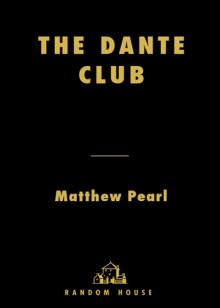 The Dante Club
The Dante Club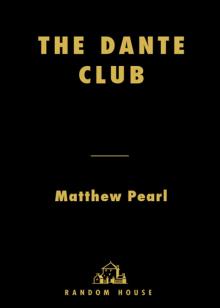 Dante Club
Dante Club The Poe Shadow
The Poe Shadow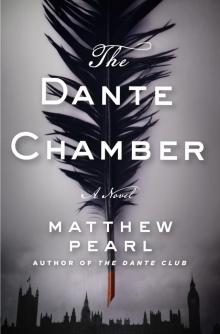 The Dante Chamber
The Dante Chamber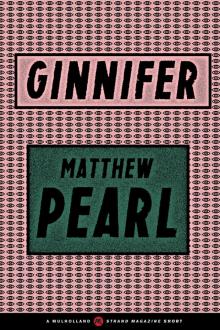 Ginnifer
Ginnifer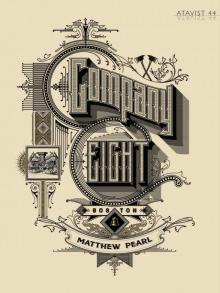 Company Eight
Company Eight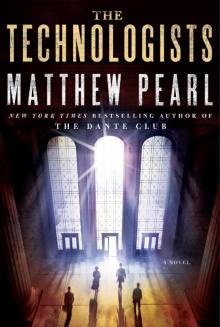 The Technologists
The Technologists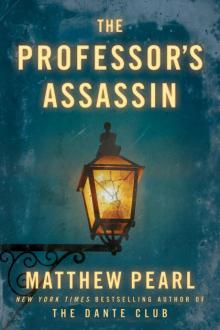 The Professor's Assassin
The Professor's Assassin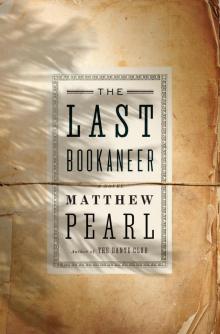 The Last Bookaneer
The Last Bookaneer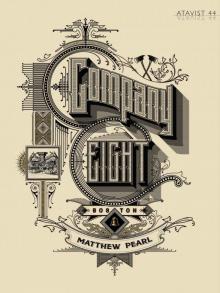 Company Eight (Kindle Single)
Company Eight (Kindle Single)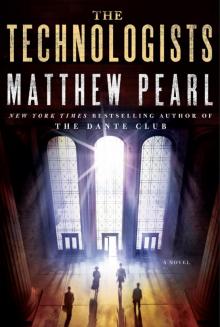 The Technologists: A Novel
The Technologists: A Novel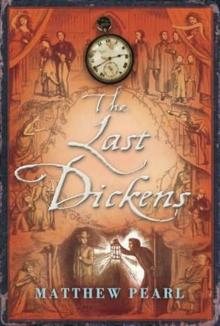 The Last Dickens
The Last Dickens